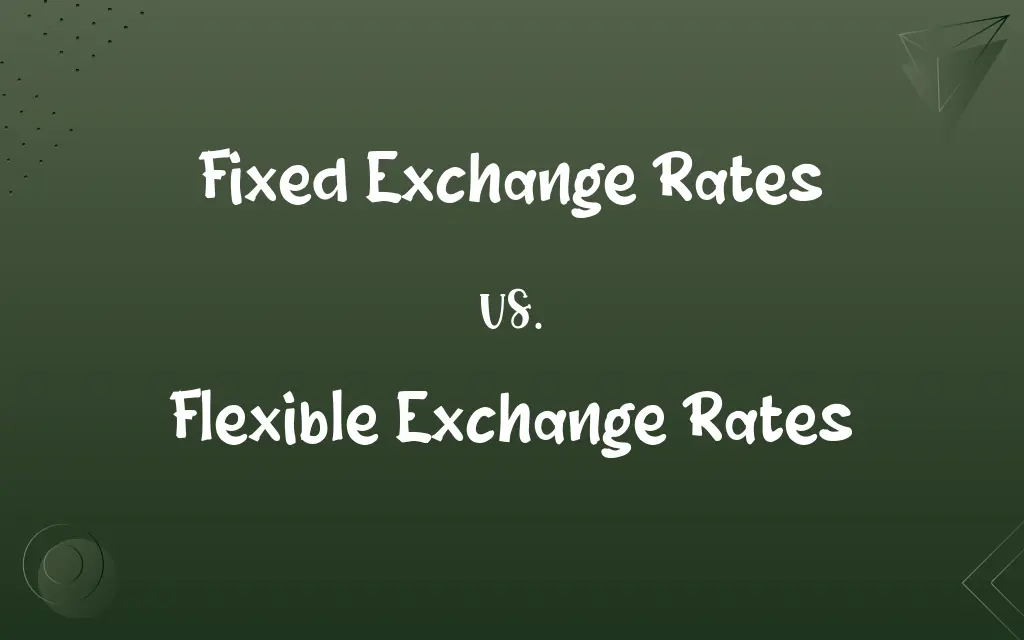Fixed Exchange Rates vs. Flexible Exchange Rates: Know the Difference

By Shumaila Saeed || Published on January 20, 2024
Fixed exchange rates are set and maintained by a government, while flexible exchange rates are determined by market forces without direct government control.

Key Differences
Fixed Exchange Rates are exchange rates set and maintained by a government or its central bank. They are pegged to a major currency or a basket of currencies. Flexible Exchange Rates, also known as floating exchange rates, are determined by the market forces of supply and demand without direct government intervention.
Shumaila Saeed
Jan 20, 2024
Fixed Exchange Rates provide stability in international trade as they eliminate exchange rate risk. This stability can be beneficial for countries with emerging economies. Flexible Exchange Rates are more dynamic and can adjust to economic conditions, providing an automatic adjustment mechanism for countries' balance of payments.
Shumaila Saeed
Jan 20, 2024
With Fixed Exchange Rates, a country must maintain large reserves of the currency to which its currency is pegged, to defend its exchange rate. This can limit a country's ability to respond to economic crises. Flexible Exchange Rates allow for a more natural adjustment to economic shocks, making countries with such systems potentially more resilient to global economic volatility.
Shumaila Saeed
Jan 20, 2024
Fixed Exchange Rates can sometimes lead to a misalignment with the true value of a currency, resulting in black markets and unofficial exchange rates. Flexible Exchange Rates, while volatile, reflect real-time economic fundamentals and market perceptions.
Shumaila Saeed
Jan 20, 2024
Fixed Exchange Rates require a significant level of government intervention in the foreign exchange market. Flexible Exchange Rates reduce the need for government intervention, as market forces largely determine the value of the currency.
Shumaila Saeed
Jan 20, 2024
ADVERTISEMENT
Comparison Chart
Stability
More stable, less susceptible to market fluctuations
More volatile, adjusts to economic conditions
Shumaila Saeed
Jan 20, 2024
Government Intervention
High level of intervention required
Minimal or no government intervention
Shumaila Saeed
Jan 20, 2024
Currency Reserves
Requires large reserves to maintain rate
Does not require large reserves for rate stability
Shumaila Saeed
Jan 20, 2024
Response to Economic Shocks
Limited flexibility in responding
More flexible and adaptive to economic changes
Shumaila Saeed
Jan 20, 2024
ADVERTISEMENT
Fixed Exchange Rates and Flexible Exchange Rates Definitions
Fixed Exchange Rates
In a fixed exchange rate system, the currency's value is tied to another major currency.
Their currency's fixed exchange rate against the euro facilitated stable trade relations.
Shumaila Saeed
Jan 08, 2024
Flexible Exchange Rates
Flexible exchange rates fluctuate based on market supply and demand forces.
The nation's currency appreciated due to high demand in the flexible exchange rate system.
Shumaila Saeed
Jan 08, 2024
Fixed Exchange Rates
Fixed exchange rates are stable currency values maintained by national monetary policies.
To stabilize the economy, the central bank adopted a fixed exchange rate system.
Shumaila Saeed
Jan 08, 2024
Flexible Exchange Rates
Flexible exchange rates can lead to rapid changes in currency values.
Increased foreign investment resulted in a swift rise in the currency's value under the flexible exchange rate.
Shumaila Saeed
Jan 08, 2024
Fixed Exchange Rates
Fixed exchange rates are government-set currency values relative to other currencies.
The country pegged its currency to the US dollar at a fixed exchange rate.
Shumaila Saeed
Jan 08, 2024
ADVERTISEMENT
Flexible Exchange Rates
Flexible exchange rates minimize government intervention in the currency market.
The country's shift to a flexible exchange rate reduced the need for central bank interference.
Shumaila Saeed
Jan 08, 2024
Fixed Exchange Rates
Fixed exchange rates involve direct government intervention to maintain currency value.
The government used its foreign reserves to defend the fixed exchange rate.
Shumaila Saeed
Jan 08, 2024
Flexible Exchange Rates
A flexible exchange rate system allows for automatic correction of trade imbalances.
The trade deficit narrowed as the flexible exchange rate depreciated the domestic currency.
Shumaila Saeed
Jan 08, 2024
Fixed Exchange Rates
Fixed exchange rates aim to provide currency stability and predictability in international trade.
Adopting a fixed exchange rate helped the country attract foreign investment.
Shumaila Saeed
Jan 08, 2024
Flexible Exchange Rates
In a flexible exchange rate system, currency values adjust to economic changes.
Post-recession, the flexible exchange rate adjusted to reflect the improved economic conditions.
Shumaila Saeed
Jan 08, 2024
Repeatedly Asked Queries
Are flexible exchange rates better for dealing with economic shocks?
Flexible exchange rates provide more adaptability in response to economic shocks.
Shumaila Saeed
Jan 20, 2024
What are fixed exchange rates?
Fixed exchange rates are currency values set and maintained by a government.
Shumaila Saeed
Jan 20, 2024
Why do countries adopt fixed exchange rates?
Countries adopt fixed exchange rates for stability in international trade.
Shumaila Saeed
Jan 20, 2024
Do fixed exchange rates require large foreign reserves?
Yes, maintaining a fixed exchange rate often requires substantial foreign reserves.
Shumaila Saeed
Jan 20, 2024
Do fixed exchange rates promote foreign investment?
They can, due to the stability and predictability they offer.
Shumaila Saeed
Jan 20, 2024
What are flexible exchange rates?
Flexible exchange rates are currency values determined by market forces.
Shumaila Saeed
Jan 20, 2024
How do governments maintain fixed exchange rates?
Governments use monetary policy and foreign reserves to maintain fixed exchange rates.
Shumaila Saeed
Jan 20, 2024
Do flexible exchange rates eliminate the need for government intervention?
They greatly reduce, but don't entirely eliminate, the need for government intervention.
Shumaila Saeed
Jan 20, 2024
How do flexible exchange rates respond to economic changes?
Flexible exchange rates adjust automatically to economic conditions and market perceptions.
Shumaila Saeed
Jan 20, 2024
Can fixed exchange rates cause currency overvaluation or undervaluation?
Yes, fixed rates can lead to misalignment with the currency's true market value.
Shumaila Saeed
Jan 20, 2024
What happens when a fixed exchange rate is unsustainable?
It can lead to devaluation, revaluation, or a shift to a flexible exchange rate.
Shumaila Saeed
Jan 20, 2024
Can flexible exchange rates lead to better competitiveness?
Yes, as they allow currency values to adjust to market conditions.
Shumaila Saeed
Jan 20, 2024
How do exchange rates impact inflation?
Fixed rates can help control inflation, while flexible rates may reflect inflationary trends.
Shumaila Saeed
Jan 20, 2024
Are flexible exchange rates used by major economies?
Many major economies, like the US and the Eurozone, use flexible exchange rates.
Shumaila Saeed
Jan 20, 2024
Can flexible exchange rates lead to currency volatility?
Yes, flexible exchange rates can be more volatile due to market dynamics.
Shumaila Saeed
Jan 20, 2024
What is currency pegging in fixed exchange rates?
Currency pegging is tying the value of a currency to another stronger currency.
Shumaila Saeed
Jan 20, 2024
How do flexible exchange rates affect trade?
Flexible rates can lead to uncertainties in trade due to currency value fluctuations.
Shumaila Saeed
Jan 20, 2024
Do fixed exchange rates require constant monitoring?
Yes, they require continuous monitoring and intervention by the government.
Shumaila Saeed
Jan 20, 2024
Can flexible exchange rates reflect a country's economic health?
Yes, they often reflect the underlying economic conditions and strength.
Shumaila Saeed
Jan 20, 2024
What role do central banks play in fixed exchange rate systems?
Central banks actively intervene to maintain the set exchange rate.
Shumaila Saeed
Jan 20, 2024
Share this page
Link for your blog / website
HTML
Link to share via messenger
About Author
Written by
Shumaila SaeedShumaila Saeed, an expert content creator with 6 years of experience, specializes in distilling complex topics into easily digestible comparisons, shining a light on the nuances that both inform and educate readers with clarity and accuracy.








































































